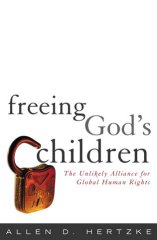
|
Posted September 23, 2004
Book: Freeing God’s Children: The Unlikely Alliance for Global Human Rights Author: Allen D. Hertzke Rowman & Littlefield Publishers, Inc., New York, pp. 421 An Excerpt from the Jacket:
Given unprecedented insider access, Allen D. Hertzke charts the rise of this faith-based movement for global human rights and tells the compelling story of the personalities and forces, clashes and compromises, strategies and protests that shape it. In doing so, Hertzke shows that by bringing attention to issues like religious persecution, Sudanese atrocities, North Korean gulags, and sex trafficking, the movement influences American foreign policy and international relations in ways unimaginable a decade ago. An Excerpt from the Book: Growing concern about citizen disengagement and cynicism has also sparked a fresh exploration of the religious contribution to a healthy civil society. This exploration often takes as its point of departure the thought of Alexis de Tocqueville, who stressed the role of churches as the crucial mediating institutions of civil society. More recently, Robert Putnam popularized the idea that trusting relationships among citizens are essential to healthy democracies, and he found that religious institutions produce roughly half of such “social capital” in America. Other political scientists have found that civic engagement is facilitated by participation in religious activities that teach civic skills and connect people to public affairs. That hardheaded empirical political scientists document this contribution to American democracy represents a departure from the previous generation that largely ignored the religious dimension. Intellectual trends within the religious community have also been important to the altered climate. Pope John Paul II has repeatedly argued that the primacy of religious freedom is “a point of reference of the other fundamental rights” and in some way “a measure of them.” A cadre of influential evangelical thinkers have joined Pope John Paul II in promoting a more theologically grounded civic consciousness among the faithful. Central here has been Charles Colson, who seeks to recover for Bible-believing Christians the heritage of social engagement from the eighteenth and nineteenth centuries when evangelicals fought against the evils of slavery and exploration of children. Others are working to help the pietistic community develop a vocabulary that will anchor political activism against injustice and the denial of human dignity. Though certainly not a dominant force in a constituency know as the bulwark of “Christian Right” moral causes, this impulse nonetheless facilitates evangelical participation in ecumenical initiatives on international human rights. Table of Contents: 1. Herod’s challenge 2. Their blood cries out 3. The barriers of Babel 4. Prepare ye the way 5. He sent a Jew 6. The hand of providence in Congress 7. Gentle as doves, wise as serpents in the Sudan battle 8. Go forth |
|
